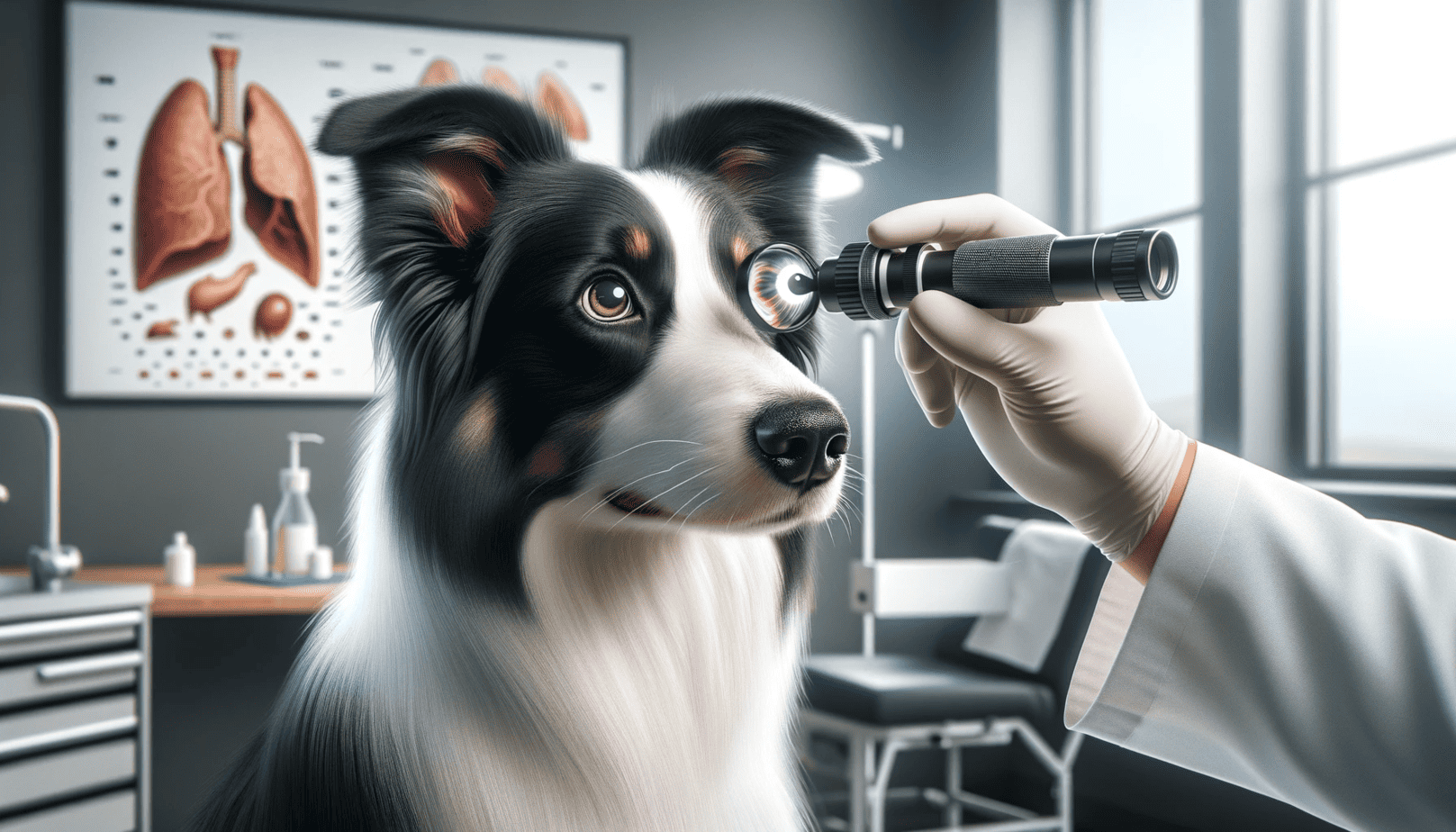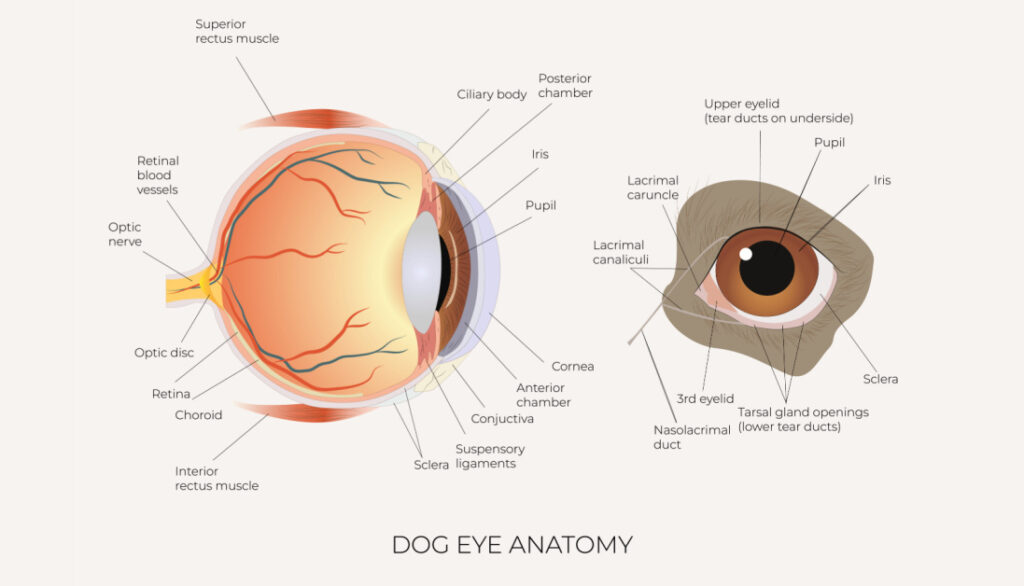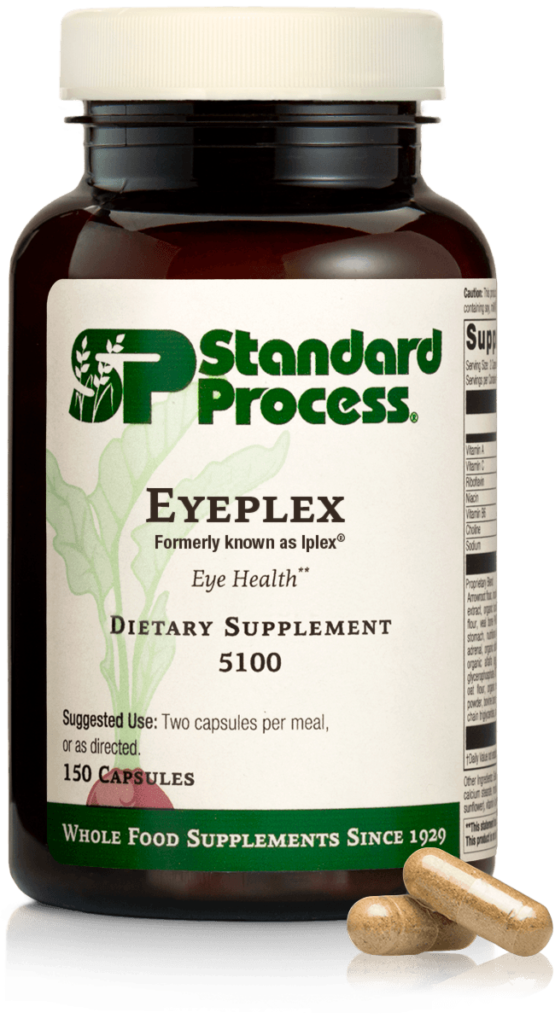As a proud Border Collie parent, you’re likely well aware of the intelligence, agility, and loyalty of your four-legged friend. But did you know that this breed is particularly prone to certain eye health issues? It’s true, and as a holistic veterinarian, I’m here to guide you through the potential challenges of Border Collie Eye Health and provide you with practical, vet-approved solutions.

Border Collies, with their alert and expressive eyes, can experience a range of eye conditions. From common issues like conjunctivitis to breed-specific diseases like Collie Eye Anomaly, understanding these conditions is the first step towards ensuring your furry friend’s ocular health.
But don’t worry, there’s plenty we can do to help protect those bright eyes. With a combination of a holistic diet, environmental hygiene, and regular eye care and maintenance, we can significantly reduce the risk of eye problems in your Border Collie. So, let’s embark on this journey together to ensure your Border Collie’s eyes remain as healthy and vibrant as their personality.
Whether you’re dealing with a current eye issue or want to stay proactive, you’re in the right place. This article will provide you with a comprehensive understanding of Border Collie Eye Health – Conditions & Solutions From Vet. So, let’s get started!

Understanding Border Collie Eye Structure
As a holistic veterinarian and a dog parent, I understand how crucial it is to comprehend the unique structure of your Border Collie’s eyes. This knowledge can help you recognize potential issues early on and ensure the best care for your furry friend’s visual health.
Border Collies, like all dogs, have a third eyelid or nictitating membrane which is an extra protective layer that humans don’t possess. This membrane provides additional protection and helps keep the eye moist. However, it can also be susceptible to certain diseases.
Border Collies also possess a higher-than-average number of rod cells in their retina. These cells enable them to see better in low light conditions, a trait that hails from their herding ancestry. However, this also makes them more prone to retinal diseases, such as Progressive Retinal Atrophy (PRA), a condition that can lead to blindness if left untreated.
Lastly, the shape and position of your Border Collie’s eyes are important to take into account. Their almond-shaped eyes are set well apart, giving them a wide field of vision. This is another hereditary trait that allowed them to effectively monitor large flocks of sheep.
Understanding these unique eye structures can help you appreciate the complex visual world your Border Collie experiences. It can also enable you to notice any abnormalities or changes in their eyes, which could indicate a potential health issue. In the next section, we’ll explore common eye problems that can affect Border Collies and discuss ways to prevent and treat these conditions. So, stay tuned!

Common Eye Issues In Border Collies
As a veterinarian, I have treated many Border Collies and I can say with certainty that they are prone to specific eye health conditions. Being aware of these potential issues can help you detect them early and seek appropriate treatment, ensuring your Border Collie maintains optimal eye health.
Collie Eye Anomaly (CEA) is one of the most common eye conditions in Border Collies. This inherited disorder affects the development of the choroid, a layer of blood vessels in the eye that supplies oxygen and nutrients. Symptoms can range from mild to severe and in worst cases, it can lead to blindness. Unfortunately, there is no cure for CEA, but the condition can be managed with regular check-ups and supportive care.
Progressive Retinal Atrophy (PRA) is another inherited disorder that affects Border Collies. It causes the gradual degeneration of the retina, leading to night blindness and eventually total blindness. While there is no cure for PRA, early detection can help manage the condition. Regular eye checks are crucial for early diagnosis.
A condition known as Primary Lens Luxation (PLL) is also common among Border Collies. This involves the dislocation of the lens in the eye, which can lead to painful inflammation and glaucoma. Surgery is often necessary to prevent irreversible damage and maintain your dog’s vision.
Lastly, Corneal Dystrophy is a condition that affects the cornea of the eye, causing it to become cloudy. While it doesn’t usually affect vision, it can lead to discomfort and inflammation. Treatment for corneal dystrophy often involves managing symptoms through eye drops and ointments.
As a pet parent, it’s essential to regularly monitor your Border Collie’s eye health. Changes in behavior, unusual eye appearance, or signs of discomfort should prompt an immediate visit to the vet. Remember, early detection and treatment can significantly improve the prognosis for many of these conditions. While some of these conditions are inherited and cannot be prevented, others can be managed or even avoided with proper care.

Nourishing Your Dog’s Vision: Essential Nutrients for Eye Health
Ensuring your Border Collie gets the right nutrients for optimal eye health is essential for maintaining clear vision and preventing age-related issues. Natural, nutrient-rich foods and supplements can play a key role in supporting their eyesight. From vitamin A-packed freeze-dried liver treats to antioxidant-rich blueberries and targeted supplements like Eyeplex by Standard Process, there are several ways to nourish your dog’s eyes. In this section, we’ll explore how these powerful ingredients contribute to long-term vision health and overall well-being.
Eyeplex by Standard Process
Eyeplex by Standard Process is a specialized supplement designed to support your Border Collie’s eye health with a blend of essential nutrients. Formulated with key vitamins, minerals, and antioxidants, Eyeplex helps protect against oxidative stress, supports retinal function, and promotes overall vision health. Ingredients like vitamin A, vitamin C, and zinc contribute to maintaining strong eyesight, while whole food ingredients provide additional phytonutrients for cellular protection. Adding Eyeplex to your Border Collie’s diet can be especially beneficial for aging dogs or breeds prone to eye conditions, offering targeted nutritional support to keep their vision sharp and healthy for years to come.

Freeze-Dried Blueberries
Freeze-dried blueberries are a powerhouse of antioxidants that can help protect your Border Collie’s eyes from oxidative stress and age-related damage. Rich in vitamins C and E, as well as anthocyanins, these tiny but mighty berries help combat free radicals that can contribute to eye diseases like cataracts and macular degeneration. Incorporating freeze-dried blueberries into your dog’s diet provides a natural and delicious way to support retinal health, reduce inflammation, and promote overall vision longevity. Plus, they’re a low-calorie, dog-friendly treat that makes a great addition to a balanced diet for long-term eye health.

Freeze-Dried Liver
Freeze-dried liver treats are an excellent natural source of vitamin A, an essential nutrient for your Border Collie’s eye health. Vitamin A plays a crucial role in maintaining good vision, especially in low-light conditions, while also supporting overall immune function and skin health. Since liver is rich in bioavailable vitamin A, incorporating freeze-dried liver treats into your dog’s diet provides a convenient and nutritious way to promote optimal eye function. Just be sure to feed them in moderation, as excessive vitamin A can lead to toxicity. Adding these nutrient-packed treats to your pup’s routine is a simple, tasty way to support their long-term vision and well-being!

By prioritizing your Border Collie’s eye health through a balanced diet and nutritional supplements, you can help prevent many common eye issues. These simple steps can go a long way in ensuring your pup’s eyes stay healthy and clear for years to come.
Environmental Hygiene To Reduce Eye Problems
As a loving Border Collie parent, you understand that your fur baby’s environment plays a crucial role in their overall health, especially their eye health. Let’s delve into some practical ways to maintain a clean, safe environment to help prevent eye problems in your Border Collie.
Indoor Air Quality
Indoor air quality can significantly impact your dog’s eye health. Dust, dander, and other airborne pollutants can irritate your Border Collie’s eyes, leading to infections or allergies. To maintain good indoor air quality:
- Regularly clean your home to reduce dust and dander.
- Consider using an air purifier to filter out harmful particles.
- Ensure your home is well-ventilated. Open windows when the weather permits to allow fresh air in.
- Avoid smoking indoors as tobacco smoke can irritate your dog’s eyes.
Sprays, Diffusers, Candles, Incense
While sprays, diffusers, candles, and incense can make your home smell wonderful, they can also cause eye irritation in your Border Collie. Here’s how you can use these products safely:
- Choose pet-friendly products. Many companies now produce pet-safe candles and sprays.
- Use these products in moderation. Too much scent can overwhelm your dog’s sensitive nose and eyes.
- Keep your dog out of the room when using sprays or diffusers.
- Ensure the room is well-ventilated after using these products.
Remember, your Border Collie’s eyes are sensitive, and what might seem harmless to you could cause them discomfort. Always be aware of their environment and how it may be affecting their eye health. It’s always better to err on the side of caution when it comes to your fur baby’s wellbeing. If you notice any changes in their eyes, such as redness, discharge, or frequent rubbing, consult your vet immediately. With proper environmental hygiene, you can help ensure your Border Collie’s eyes stay healthy and bright.

When it comes to Border Collie Eye Health, regular care and maintenance play a crucial role. This routine involves daily and weekly checks, along with monitoring aspects like hair and nail length, and bath frequency. Let’s delve into these aspects in more detail.
Daily & Weekly Care & Maintenance
For the daily care of your Border Collie’s eyes, it’s important to keep a close check for any signs of redness, irritation, or discharge. A simple way to do this is by making it a habit to examine your dog’s eyes during playtime or while grooming. If you notice any abnormalities, it’s best to consult a vet immediately.
Weekly care involves a more thorough examination. Use a soft, damp cloth to gently clean the area around the eyes. Be careful to avoid getting water or cleaning solution in the eyes as this can cause irritation. Also, keep an eye out for any changes in the color or clarity of the eyes, as these might indicate an underlying health issue.
Monitoring Hair Length, Nail Length, Bath Frequency
While these might not directly relate to eye health, they play a significant role in overall hygiene, which indirectly affects the eyes. For instance, long hair around the eyes can lead to irritation and increase the risk of eye infections. Regularly trimming the hair around the eyes can help mitigate this risk.
Similarly, long nails can lead to accidental scratches on the eyes. Therefore, it’s essential to maintain a regular nail trimming schedule. Lastly, a regular bath routine is crucial in maintaining overall hygiene and preventing the spread of bacteria that can potentially harm the eyes.
Proper care and maintenance of your Border Collie’s eyes are key factors in preventing common eye issues. Remember, the health of your dog’s eyes is just as important as any other aspect of their health. So, always keep an eye out for any signs of trouble, and don’t hesitate to consult a vet if you notice anything unusual. After all, when it comes to Border Collie Eye Health – Conditions & Solutions From Vet, prevention is always better than cure.
Frequently Asked Questions
1. What are common eye conditions in Border Collies?
Border Collies are prone to several eye conditions, including Collie Eye Anomaly (CEA), Progressive Retinal Atrophy (PRA), and cataracts.
2. How can I identify if my Border Collie has an eye problem?
Watch out for symptoms such as excessive tearing, redness, cloudiness, squinting, bumping into objects, or changes in behavior related to vision. If you notice any of these signs, it’s important to consult a veterinarian.
3. Can eye conditions in Border Collies be treated?
The treatment options depend on the specific eye condition. Some conditions, like cataracts, may require surgical intervention, while others may have management strategies to slow down the progression or alleviate symptoms. It is best to consult with a veterinarian for an accurate diagnosis and appropriate treatment plan.
4. How can I prevent eye problems in my Border Collie?
While not all eye conditions can be prevented, there are some measures you can take to promote good eye health in your Border Collie. Regular veterinary check-ups, proper nutrition, avoiding exposure to harmful substances, and protecting their eyes from injuries can help reduce the risk of eye problems.
5. Are Border Collies more prone to eye problems compared to other breeds?
Yes, Border Collies are more susceptible to certain eye conditions compared to other breeds. It is important to be aware of these potential issues and take proactive steps to monitor and care for their eye health.
